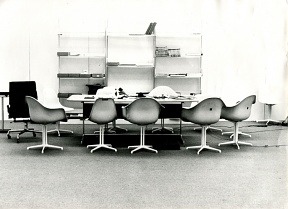
Tuesday 27 November 2012, 2–6pm
A lot of terms you’ve been using lately have lost their single meaning. You have shattered the monopoly of appropriation. They have made their way through you to re-emerge marked by your own hells and paradises, charged with a new sap which reaches them form the network of roots which you have woven in order to bind together words and their most vital energy
– Abdellatif Laâbi, Rue du Retour (Readers International, 1989)
The Artists Placement Group’s gradual dissolution in the mid to late eighties occurred at the peak of a significant phase in Britain’s adjustment from an industrial to a service based economy. Like APG, many of the organisations which had hosted its artists would not see the decade out. British Steel and the National Coal Board, for example, were both combatively privatised during this period. And yet, in spite of APG and its hosts’ evaporation, many of the discourses associated with their mutual engagement have persisted.
This has particularly and most visibly been the case with those linked to notions of expanded practice and artists’ social engagement, but no less with ideas of artistic ‘embeddedness’ in corporate and state institutions – all of which link explicitly or less explicitly to concepts like ‘the disappearance of the artist’, the ‘Incidental Person’, the artist as consultant, the ‘bureaucratic aesthetic’, the ‘spoof work’ etc. All of these concepts seem to have been both opaque and enactable enough to remain in relatively uninterrupted circulation throughout the intervening period, even coming powerfully into ascendance over the last few years in art’s notional political turn.
The aim of this informal workshop hosted by long-term collaborators Anthony Davies, Jakob Jakobsen and Howard Slater was to examine, interrupt and simply read from the array of documents that have been gathered at Raven Row. In the face of this material no one can stake a claim to knowledge and remain untroubled. A willful ignorance may help to ‘shatter the monopoly of appropriation’ of APG, its various legacies and those critical narratives that surround it – this would include both the current modes of recuperation on public display in Raven Row and our own attempts to 'discourse' around APG practice. Aided by historical material, much of which has been made available for the first time, it is hoped that a collectively formed understanding of those various practices that helped make up APG will ‘re-emerge marked by our own hells and paradises’ as these are engraved by the present time.
Vacant State used selected APG histories as starting points: Garth Evans’ placement at British Steel (1969–70), Ian Breakwell’s placement at the Department of Health and Social Security (Rampton and Broadmoor high security psychiatric hospitals) (1976), John Latham’s feasibility study with the Scottish Office (1975–76), as well as a sampling of miscellaneous footage of APG at the Hayward Gallery 1971. The workshop began with a short reading from Finnegan’s Wakein recognition of John Latham’s use of language as concept-generating material.
Other events
Monday 19 November 2012, 6.30pm
Audio recording